Zulu Dawn Blu-ray Movie
HomeZulu Dawn Blu-ray Movie 
Severin Films | 1979 | 115 min | Not rated | Mar 12, 2013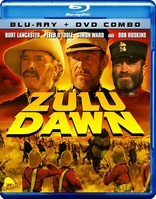
Movie rating
7.2 | / 10 |
Blu-ray rating
| Users | 3.0 | |
| Reviewer | 3.5 | |
| Overall | 3.3 |
Overview
Zulu Dawn (1979)
In 1879, the British suffer a great loss at the Battle of Isandlwana due to incompetent leadership. Despite the defeat, the Zulus are first humiliated at Rorke's Drift and then crushed at the Battle of Ulundi.
Starring: Burt Lancaster, Simon Ward, Denholm Elliott, Peter O'Toole, James FaulknerDirector: Douglas Hickox
| Adventure | Uncertain |
| Action | Uncertain |
Specifications
Video
Video codec: MPEG-4 AVC
Video resolution: 1080p
Aspect ratio: 2.35:1
Original aspect ratio: 2.39:1
Audio
English: DTS-HD Master Audio Mono
English: Dolby Digital 2.0
Subtitles
None
Discs
25GB Blu-ray Disc
Two-disc set (1 BD, 1 DVD)
Playback
Region A, B (locked)
Review
Rating summary
| Movie | 3.0 | |
| Video | 3.0 | |
| Audio | 4.0 | |
| Extras | 3.0 | |
| Overall | 3.5 |
Zulu Dawn Blu-ray Movie Review
Africa Screams.
Reviewed by Jeffrey Kauffman March 11, 2013Indigenous peoples continents apart had something of a last gasp of supremacy over the course of just a couple of years or so in the 1870s. In the United States, 1876 saw the Great Sioux War have an unexpected (and one would almost expect nearly decisive) victory by a coterie of tribes including the Lakota, Northern Cheyenne and Arapaho at Little Big Horn. Only around two and a half years later, in early 1879, the British experienced something akin to the shock and awe that must have been the last emotions of General Custer and his troops, when their ostensibly easy task of invading Zululand ended in an absolute rout—by the Zulu. There’s a certain arrogance that seems to underpin the somewhat linked ideas of Imperialism (and/or Colonialism) and the more frequently bandied about idea on this side of the pond of Manifest Destiny, and some might argue both of these events were well deserved comeuppances for cultures and governments who simply assumed that lands (and peoples) were there for their taking. One might think the British had learned some salient lessons from such previous disasters as the Charge of the Light Brigade (where after all they were up against another major nation with well armed combatants, let alone some supposed “primitives”), but not only did British stupidity not end with that strategic blunder, even the devastating defeat in the Zulu encounter temper their approach, as the 1885 uprising in Khartoum easily proves (though that incident at least is somewhat more understandable, since Gordon didn’t have overwhelming forces at his command to immediately fight the uprising). Zulu never really rises to the level of the best historical epics, due perhaps as much to the obvious British angle, which may not translate well to American audiences, many of whom will most likely be scratching their heads over some pretty dunderheaded British behavior, including but not necessarily limited to their strategy on the battlefield.
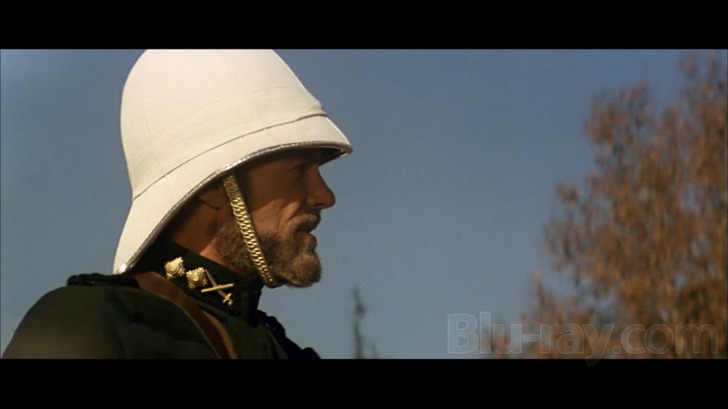
Years ago when our sons were toddlers and I had put on our local PBS station to keep them occupied for a while, I was gobsmacked (an appropriately British term) to stumble upon a completely peculiar English children’s show entitled Bananas in Pajamas. The title pretty much sums up the entertainment value of the series, and when my wife returned home later that day, I told her about it, adding, “It‘s clear to me now why the British lost the Empire.” All joking aside, American expat Cy Endfield, denounced as a Communist and forced to relocate to Great Britain (as so many artists of his generation had to), obviously had an abiding interest in Britain’s missteps in its Imperialistic ambitions. One of Endfield’s best remembered films is the 1964 film Zulu (there’s evidently a new domestic Blu- ray available, but the fact that it isn’t a Paramount release, has iffy cover art and sports the exciting information that it’s a “widescreen edition” gives me grave doubts about its quality). Endfield actually returned to the subject matter years later in book form, writing an account of the Zulu uprising which in turn became fodder for Zulu Dawn in 1979.
We’re introduced to a raft of major characters in the early going in Zulu Dawn. Peter O’Toole portrays the unctuous Lord Chelmsford, a martinet who is of course completely convinced that inherent British superiority will always vanquish the perceived inadequacies of native peoples. Burt Lancaster, in one of the most interesting roles in his long and varied career, plays good cop to O’Toole’s bad, as Colonel Durnford, an Irish officer who commands an African brigade and who seems to understand the native land (and people) much more intuitively than Chelmsford ever could. (This is one of the very few films, if not the only film, that I can recall where Lancaster does a dialect or accent, and he’s quite convincing.) Denholm Elliott depicts Colonel Pulleine, a coconspirator of sorts with Chelmsford who issues an ultimatum to the Zulu that he knows they can’t tolerate, precipitating the conflict. The supporting cast is similarly huge and varied, and includes Simon Ward (who played another iconic Brit in Richard Attenborough’s Young Winston), Bob Hoskins, and Nicholas and Alexandra’s Michael Jayston.
Zulu Dawn is compelling quite a bit of the time, and of course it becomes easier and easier to root for the Zulu once the ironic savagery of the British becomes more and more apparent, but at the same time, there’s a certain distance this film has that makes the events play like a diorama at times rather than a living, breathing document of what actually happened. Some of this distance is no doubt due, as mentioned above, to the relative ignorance many Americans will have about the events, but part of it stems from the very tamped down, emotionless nature for which Brits are so justly famous.
Douglas Hickox does get a number of standout performances from both his western and African actors, and the film has a decidedly epic visual sweep, especially once it journeys out into what is known as Rorke’s Drift, where the decisive battle was waged. Zulu remains one of the most exciting historical films of its era, and if this prequel doesn’t quite capture lightning in a bottle twice, it helps to illuminate Britain’s own Little Big Horn, when a technologically superior force found they were no match for an indigenous people armed with a fire in their collective belly.
Zulu Dawn Blu-ray Movie, Video Quality 
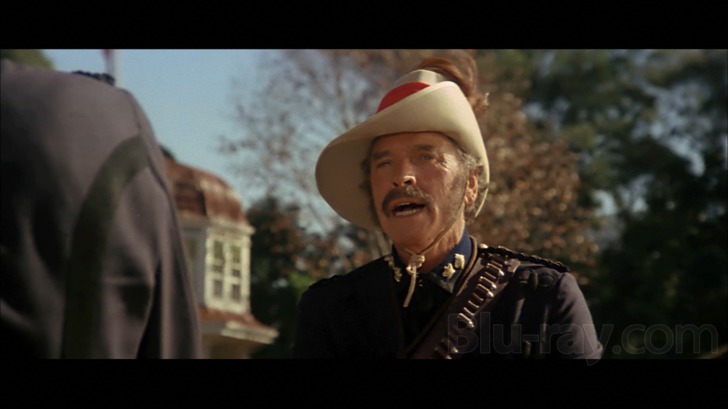
Zulu Dawn is presented on Blu-ray courtesy of Severin Films with an AVC encoded 1080p transfer in 2.35:1 (this may mean that Severin has finally forsaken the older MPEG-2 codec for its Blu-ray releases). Severin is touting this as having been restored, and it must be admitted that the elements are in remarkably good condition overall, with one notable exception. Several times throughout the film there are what appear to be a missing frame, leading to just very slight jumps in the fluidity of the motion. It's really noticeable in the clips in the main The History of the Zulu Wars featurette included as a supplement, and at times almost looks like what you see when a PAL source has been converted to NTSC. That anomaly aside, this is really a rather nice looking high definition presentation. My hunch is there has been some noise reduction applied to this release, but there is definitely fine grain (as in fine grain) noticeable when the film is in motion, especially in the many outdoor scenes where it's quite visible in the skies. Colors are nicely robust (if the reds are just slightly on the orange side, as the screenshots accompanying this review show) and fine detail pops quite well in close-ups.
Zulu Dawn Blu-ray Movie, Audio Quality 
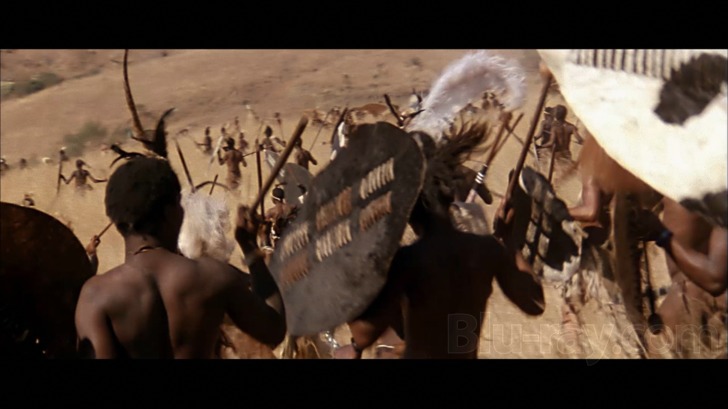
Severin Films is still getting its feet wet in the Blu-ray market and it's a good sign that this release has a lossless audio option. Both a DTS-HD Master Audio Mono mix as well as a Dolby Digital 2.0 (mono) mix are included on this Blu-ray. The lossless track sounds very good indeed, with dialogue clean (if sometimes a bit hard to decipher due to the accents) and Elmer Bernstein's exciting score well rendered. Anyone who is a fan of Bernstein's amazing work in Hawaii knows how well the composer utilizes ethnic instruments (especially percussion) and voices, and he does much the same thing in this film. While this track is obviously narrow, it has some requisite dynamic range, especially in several key action sequences.
Zulu Dawn Blu-ray Movie, Special Features and Extras 
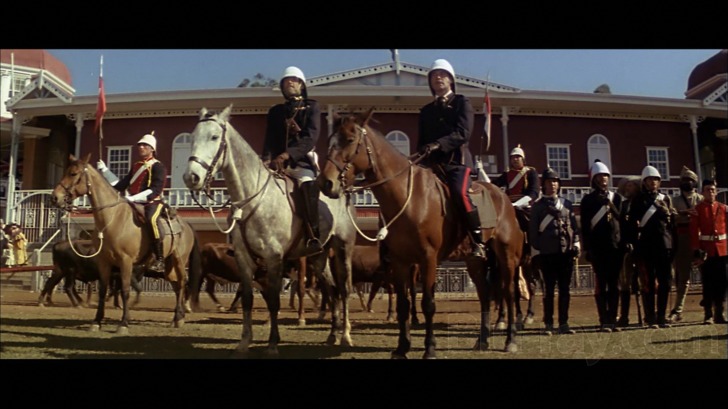
- The History of the Zulu Wars (1080p; 25:34) is a really interesting documentary featuring Ian Knight, author of Zulu Rising – The Epic Story of Isanlwana and Rorke's Drift, who provides a wealth of background information and context that really helps the viewer to better appreciate some of the finer details of the film.
- Recreating the War (480i; 20:19) looks back on the historical accuracy of the film, and includes interviews with Midge Carter (a male), who was the historical advisor.
- A Visit to the Battlefield (480i; 16:47) features Ian Knight again, taking us on a little guided tour of the actual historical locations.
- Theatrical Trailer (480i; 3:00)
- Outtakes (480i; 12:14). These are in pretty poor shape, image wise, but they're fascinating to watch as they show director Douglas Hickox in action.
Zulu Dawn Blu-ray Movie, Overall Score and Recommendation 

Zulu Dawn has that "veddy, veddy British" dissociative quality, and so most of the emotional heft of these piece comes (perhaps appropriately) from the Zulu. The history here is going to be largely unknown to many Americans, and so the accompanying featurettes are a really excellent and smartly conceived set of supplements, and in fact some may want to start with them before watching the actual film, as they give some good context and background. The performances here are excellent all around, especially Lancaster in a really unusual role for the actor. If the film never quite reaches out and grabs the viewer, it's still an often exciting and moving tale that sheds some light on a particularly ill conceived moment in British Imperialistic history. This Blu-ray offers very good (if occasionally problematic) video, excellent audio and very good supplements, and it comes Recommended.
Similar titles
Similar titles you might also like

The Man Who Would Be King
Warner Archive Collection
1975

Khartoum
1966

The Dogs of War
New 2K Restoration
1980

Air America 4K
1990

The Big Red One
Theatrical Cut & Reconstructed Version in SD
1980

To Hell and Back
1955

Flight of the Intruder
1991

The 7th Dawn
1964

The Young Lions
Limited Edition to 3000 - SOLD OUT
1958

The Wild Geese
1978

The Green Berets
1968

The Fighting Kentuckian
1949

The Vikings
1958

Twelve O'Clock High
1949

Ice Cold in Alex
1958

The Blue Max
Limited Edition to 3000 - SOLD OUT
1966

Play Dirty
1969

Hamburger Hill
1987

Memphis Belle
1990

Sink the Bismarck!
1960
